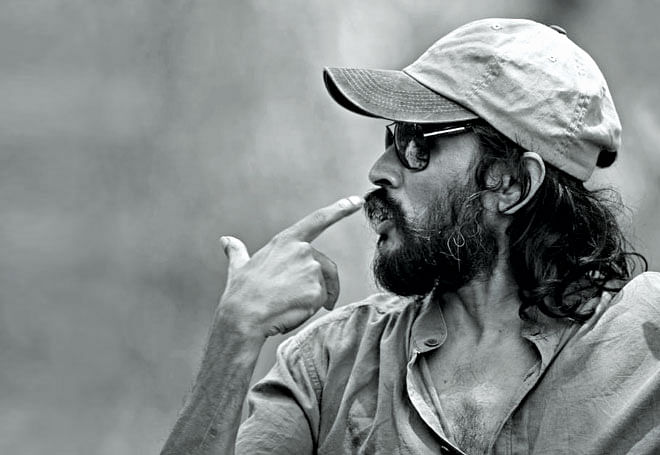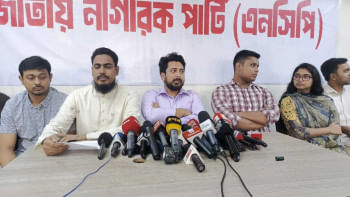Ten Things You Didn't Know About <br> NURUL ALAM ATIQUE

Nurul Alam Atique, a well-known name in the showbiz world of Bangladesh, was awarded the Meril Prothom Alo Best Script Writer and Director Award in 2002. He is greatly influenced by the political and social culture in Bangladesh and this aspires to channel his imagination to narrate stories that our society can relate to. Star Showbiz caught up with him to know his thoughts and experiences in direction.
1. How did you begin your career as a director?
Actually, I didn't have the intention of becoming a director. I was involved in the film societies in my early days. I used to chat very often with people concerned with our media. Chatting and conversation opened a new vista of looking at things. After I became interested in movie making, I got admitted into Film and Television Institute, India but I could not complete my course due to some personal issues. However, I first started working in this field in the year 1999 or 2000 with an organization named 'Jolchobi'.
2. What was your first production as a director?
I directed 'Choturtho Matra' in 2000. It won the Meril Prothom Alo Critic Award in 2002. I also worked in a movie named 'Gayotri Sondhay' that was focused on the poetry of Binoy Majumder in West Bengal. But, for some reasons, the production was halted in the middle of the work. Besides, I worked as an assistant director with Tareque Masud, Giasuddin Selim and many others on many productions.
3. Who inspires you in your direction? What are your favorite movies?
I started watching movies from my school life. I was obsessed with the work of AndreiTarkovsky, Hrithik Gothok, Orson Welles, Richard Linklater and many others who are considered masterminds of movies of our time. I find the movies 'F for Fake' by Orson Welles and 'Waking Life' by Richard Linklater are really amazing in terms of direction and storytelling. Recently, my passion for Turkish, Hungarian and Korean movies are growing. I enjoyed the movie 'The Turin Horse' by Béla Tarr.
4. Who have you enjoyed working with the most?
I have not worked with many people. The people who were accessible easily and match my ideas and thinking were basically my crew. In that sense, I liked working with Joya Ahsan the most. I think she is very talented. Besides, Deehan and Ashok Bepari are a few among others who I enjoy working with.
5. What are the challenges you face as a director in Bangladesh?
I worked in television production basically. From that experience, I would say that the tendency of making television fiction is no more. Television owners are more focused on covering their television time rather than assuring quality of programs. Besides, they cannot evaluate the creative art; hence there is really no motivation to produce interesting and innovative stories. It is very tough to work with people who cannot assess the value of art.
6. What are the causes that leave us unsuccessful in making good movies?
I would not say that we are unsuccessful in making good movies. If you notice our recent past, you will see that we have made some good movies which are internationally acclaimed. I think the problem lies somewhere else. I would say that the problem is with our political and social culture that keeps our ambition small. We cannot dream bigger. It is our cultural crisis that we have lost our visionary attitude in every aspect. We have destroyed our culture. We have moved afar from our agriculture and river based culture which is considered unique and traditional. We have forgotten how to learn from our surrounding atmosphere and be inspired. Again, we have failed to adjust with the demand of time that dictates the twenty first century.
7. Do you think working on television productions can help one in movie making later?
I don't really think so. If someone is interested in movie making, I would suggest him to keep away from television. The platform of television has been ruined a long time ago in Bangladesh. When we used to work, there was less access to movie making. Presently, when there are lots of scope to movie making, people should avoid the television. To me, television in these days spoils the creativity of a director.
8. Our movies are often flat in theme and the plots are often adopted from movies outside. In your opinion, what are the causes behind this?
It is true that our scripts are often based on outdated themes and plots. We also see that the plots are often adopted from foreign movies. I think it is because we have lost our vision and foresight. We have lost interest in life and living. We could not grow the understanding of time. We did not have to adopt things if we could learn from our life and surrounding. We take the west for granted for everything which we need to re-consider.
9. It seems there are lots of problems in our media. What can be the solutions to these problems?
See, I am not a political leader. Therefore, I cannot provide solutions. I would like to work and keep on working. I just feel that we lack visionary people and have a cultural crisis – these define us predominantly. We need to make a room for our own language and culture in our media.
10. Where do you see yourself ten years from now? Do you always want to be a director?
I really don't know where I would be ten years from now. But I would like to work in other areas alongside my direction. I would like to develop contents of my own. But yes, most importantly, I would like to develop myself as a director.
Interviewed by
Mohammad Zahidul Islam
Photo: Ayan Rehal & Shankar Shaojaal

 For all latest news, follow The Daily Star's Google News channel.
For all latest news, follow The Daily Star's Google News channel. 



Comments